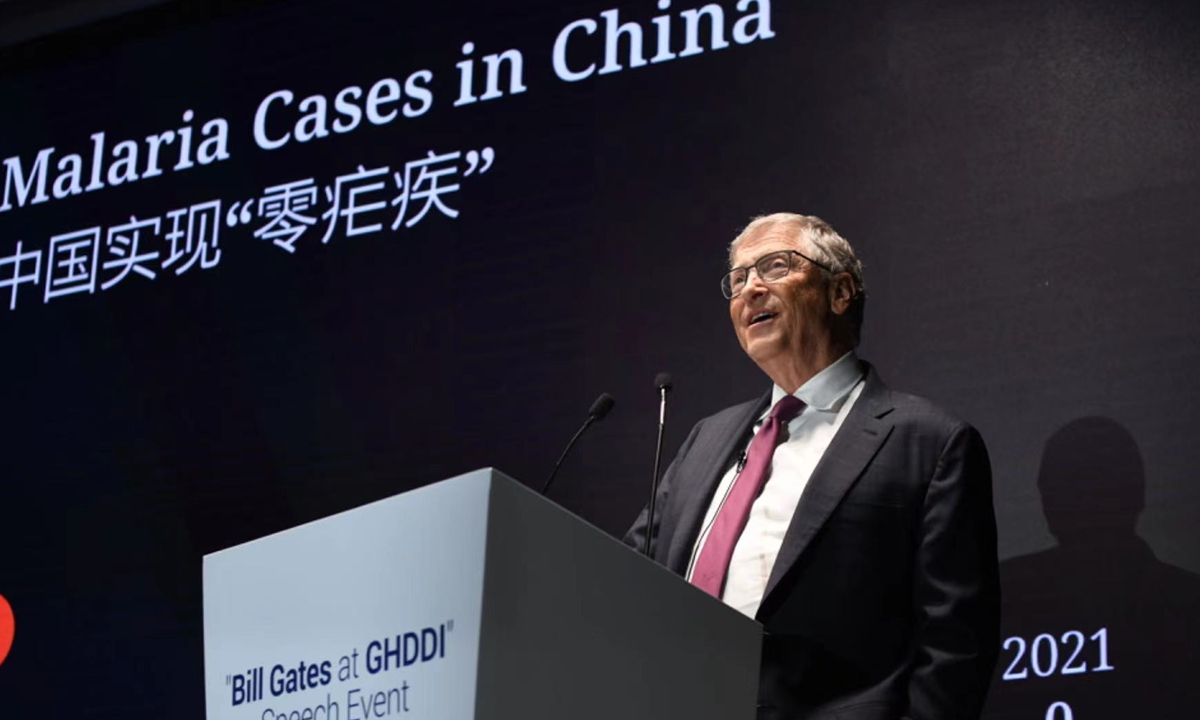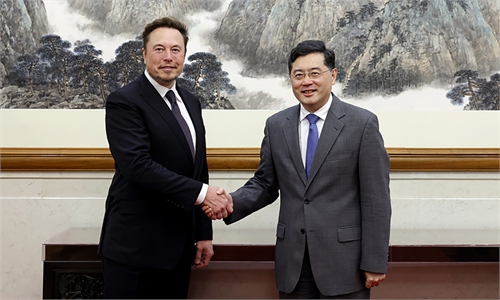Gates Foundation to donate $50m to partnership in China amid Microsoft co-founder’s visit
US firms, organizations boost Chinese ties, despite diplomatic tension

Bill Gates delivers a speech at the Global Health Drug Discovery Institute in Beijing on June 15, 2023. Photo: Courtesy of the Bill & Melinda Gates Foundation
The Bill & Melinda Gates Foundation on Thursday announced that it has renewed collaboration with the Beijing Municipal Government and Tsinghua University on innovative therapies for infectious diseases prevalent in low- and middle-income countries, pledging a donation of $50 million for the joint endeavor.
The announcement was made as Bill Gates, co-founder of Microsoft and co-chair of the Bill & Melinda Gates Foundation, visits China for the first since 2019. In a speech on Thursday, Gates highlighted Chinese innovators' "important role" and China's "invaluable experience" in tackling issues such as health and poverty reduction.
"It's been a long time since I was in China - four years. The world looked very different then," Gates said in a speech delivered at the Global Health Drug Discovery Institute (GHDDI) in Beijing, pointing to rising challenges facing the world. "The need to meaningfully address these challenges has never been more urgent," Gates said, according to a transcript of his speech shared with the Global Times on Thursday.
The GHDDI was jointly founded by the Gates Foundation, Tsinghua University and the Beijing Municipal Government in 2016. It is an independent and not-for-profit research organization, the first of its kind in China, aiming to improve global health through the accelerated development of new drugs and innovative technologies to tackle diseases that disproportionately affect populations in the developing world.
To bolster the GHDDI's drug discovery capacity, the Gates Foundation will provide US$50 million to the institute, which will be matched by the Beijing Municipal Government, the foundation said in a press release sent to the Global Times on Thursday.
Tsinghua University will also continue to support the GHDDI in areas such as building and sharing research platforms, translating research discoveries and developing talent, the press release said.
"Chinese innovators have an important role to play in these global partnerships. China has invaluable experience to share from its own successes in health, agriculture, nutrition and poverty reduction," Gates said.
"I think Gates' visit to China makes clear his willingness to continue to cooperate with China," Hu Qimu, a deputy secretary-general of the digital real economies integration Forum 50, told the Global Times on Thursday, pointing to China's open arms for such cooperation as well as its rapid development.
In his speech on Thursday, Gates noted that China has made significant gains in reducing poverty and improving health outcomes. "I'm hopeful China can play an even bigger role in addressing the current challenges, particularly those facing African countries."
A stream of high-profile foreign executives has visited China in recent weeks. Before Gates' arrival, Tesla CEO Elon Musk visited Beijing and Shanghai at the end of May, and Apple CEO Tim Cook made a trip to China in March.
All the US tech executives were warmly welcomed by Chinese officials and sparked much fanfare among the Chinese public. For example, when Gates announced his arrival in a post to Chinese social media platform Sina Weibo, many extended warm welcomes. "[Gates] has always been friendly to China… welcome! When friends visit us, we welcome them with fine wine," one social media user commented.
This presents a stark contrast to the hostile US approach toward China, with endless crackdowns on Chinese businesses and executives. It also underscores the unpopularity and limitations of Washington's "decoupling" or "de-risking" attempts, experts noted.
"On the one hand, for their own interests, it is unacceptable for businesses to be forced to give up such a large market as China without a good alternative. On the other hand, China has always adopted an open attitude, actively engaging foreign companies and stepping up efforts to attract multinationals," Hu said. "It is a mutual aspiration."
While the US business community's focus on the Chinese market may not make a major impact on US policy toward China, as Washington is fixated on rivalry, it could help stabilize bilateral economic cooperation, which could lead to a shift over time, Hu said. "We can only be cautiously optimistic."
Many in China have grown suspicious and even annoyed about the US' two-faced approach toward China - seeking dialogue with Chinese officials and vowing to avoid confrontation, while continuing to stir up tension with China as part of its containment strategy.
This was fully reflected in Chinese social media users' reaction to the upcoming visit of US Secretary of State Antony Blinken from June 18 to 19. On Sina Weibo, many said they do not have high expectations for the visit, after the US reportedly played down expectations for any breakthrough from the trip.

